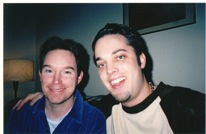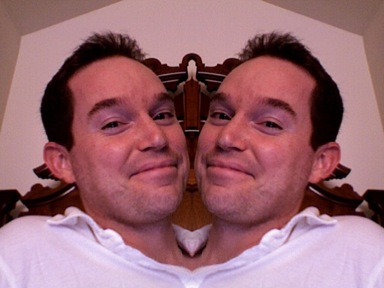
My wife has returned from Mexico (at long last!) and I have been looking for any excuse to hang out with her. I even chauffeured her around town all day yesterday as she ran errands. While waiting for her in the Anthropology Department lounge, I picked up an old issue of Mother Jones magazine and read a fascinating article about the placebo effect and the science of depression.
Is is Prozac? Or Placebo?, by Gary Greenberg
Now, I’ll say up front that I am strongly biased against the completely false, flat out wrong notion that so-called “mental illnesses” are the result of chemical imbalances in the brain. So, of course, an article exposing the lunacy that reigns throughout the world of psychiatry and Big Pharma would appeal to my sensibilities. I have ranted about this before [Anxiety and Elephants], and I won’t tire my fingers further except to explore how this controversy relates to the broader issue of how our beliefs and our actions based on these beliefs are continually formed, propped up and maintained by simple ignorance. If ideas were merely private delusions or harmless little daydreams, I might not be so worried, but because they are used to justify such things as murder and brain-rape, it would be nice if we all came to deeper understanding of just how we “came to believe” the things we believe.
We start with an obvious truth, i.e. that any change in behavior and experience correlates to some change in physiology. If it were possible to completely and accurately record my neurotransmitter activity, heart rate, hormone levels, muscular tension, etc., one could have easily observed some dramatic changes in me when my wife arrived from Mexico. However, only a moron would suggest that my sense of joy was caused by a shift in chemical balance, when obviously that shift had a lot to do my wife’s return, and how much I missed her, and a million other things. No happy pill could have mimicked the effect of my wife’s presence, although I’m sure some drug company is hard at work on one. Add to this the fact that some problems in behavior and experience are primarily the result of structural damage, and you can easily befuddle the mind of someone who doesn’t know any better, if it suits your agenda to do so. A brain tumor is diagnosed by seeing it on a scan, then it’s removed if possible, then a person’s behavior is observed sans tumor. To my knowledge, no one has EVER been diagnosed with depression based on a brain scan or a sample of brain tissue or a measure of neurotransmitter levels. And yet it is standard practice to intervene chemically.
Which is fine, as long as the person understands the implications of this decision. Fear happens in response to a situation, as does anger and sadness and lust and boredom and anxiety and pain. The clear perception of these feelings will lead to the appropriate, healthful response, just like the burn of a hot stove will lead to the quick removal of one’s hand from it. But since our social conditioning and/or economic status can render us unwilling or unable to respond appropriately to complex emotional situations, we might choose to take a pill because changing our relationship to the situation might not be feasible (although sometimes it is feasible, just difficult). So, prozac is fine, and can help people feel better, just like alcohol or marijuana can, but let’s not tell lies about what’s really going on, and about the risks involved. Sure, my chemistry might be unbalanced and my stress hormones elevated as a result of working long hours at a crappy job, so I can choose to get loaded after work sometimes, or if I can afford healthcare, maybe I can get a prescription for some Xanax. But wouldn’t it be better and more appropriate to find a more meaningful job, or to find a better way to cope with my difficult situation?
Drug companies and doctors are taking advantage of the fact that people want to believe they have chemical imbalances that can be taken care of with pills. This false belief robs people of potential personal growth. Just as religious fundamentalism robs people of potential spiritual realization. Of course, I acknowledge that many people credit psychiatric medications for saving their lives and for giving them the opportunity to grow personally. Again, meds can and do help people. But this does not justify the marketing and propaganda that clouds people’s understanding as to what is really involved in personal problems. The fact that a person is helped by a chemical does not mean that a chemical intervention was necessary or that the problem was primarily a chemical one. You can also buy a new computer every time the battery runs out, and new dishes after every meal. You might get a functioning computer and clean dishes that way, but you’ve completely bypassed the problem and paid too high a price.
If I went to the ER with a spider locked on to my hand, biting me repeatedly, and the doctor told me that my pain was caused by firing pain receptors in my brain, and then wrote me a script for some pain killers, I would think him insane and ask him to help me get the fucking spider off of my hand.
So, you can start with a common sense truth about physiology, color it with the depressed person’s willingness to believe anything that might bring relief, mix it with the drug companies’ desire to make as much money as possible, and you get a really fucked-up formula for disaster. In terms of religious fundamentalism, you start with a person’s anxiety in the face of suffering and uncertainty, couple that with other people’s desire for power and control, and throw in a heap of ignorance and shake well.
It’s amazing that any of us can communicate with each other and come to any degree of mutual understanding, given the way our thinking is subject to the forces of collective ignorance, neuroses and a lack of awareness run amok. It’s times like these I can deeply relate to Ken Wilber’s passionate conviction that a new way of looking at things is necessary if we are to make any progress in addressing the endless difficulties in our world today. Some days I’m content to gently express my convictions through my daily living, leaving others to be as they choose to be. But today I say “Fuck that shit!” People are being brain-raped in the name of science, and killed in the name of God. And I know it’s wrong.












